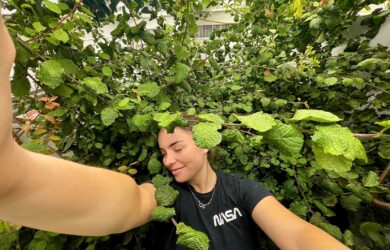
New study led by Matt Cassels casts light on role of pets in child development.
Anyone who has loved a childhood pet knows that we turn to them for companionship and disclosure, just like relationships between people.
Matt Cassels
Children get more satisfaction from relationships with their pets than with their brothers or sisters, according to a newly published study led by a Gates Cambridge Scholar.
Children also appear to get on even better with their animal companions than with siblings. The research adds to increasing evidence that household pets may have a major influence on child development and could have a positive impact on children’s social skills and emotional well-being.
Pets are almost as common as siblings in western households, although there are relatively few studies on the importance of child-pet relationships. ‘‘Anyone who has loved a childhood pet knows that we turn to them for companionship and disclosure, just like relationships between people,” says lead researcher Matt Cassels [2014], who is doing a PhD in Psychiatry at the University of Cambridge. “We wanted to know how strong these relationships are with pets relative to other close family ties. Ultimately this may enable us to understand how animals contribute to healthy child development.”
This study, published in the Journal of Applied Developmental Psychology, was conducted in collaboration with the WALTHAM Centre for Pet Nutrition, part of Mars Petcare and co-funded by the Economic and Social Research Council as part of a larger study, led by Professor Claire Hughes at the University of Cambridge Centre for Family Research. Researchers surveyed 12 year old children from 77 families with one or more pets of any type and more than one child at home. Children reported strong relationships with their pets relative to their siblings, with lower levels of conflict and greater satisfaction in owners of dogs than other kinds of pets.
‘‘Even though pets may not fully understand or respond verbally, the level of disclosure to pets was no less than to siblings,” says Cassels. “The fact that pets cannot understand or talk back may even be a benefit as it means they are completely non-judgmental. While previous research has often found that boys report stronger relationships with their pets than girls do, we actually found the opposite. While boys and girls were equally satisfied with their pets, girls reported more disclosure, companionship, and conflict with their pet than did boys, perhaps indicating that girls may interact with their pets in more nuanced ways.’’
“Evidence continues to grow showing that pets have positive benefits on human health and community cohesion,” says WALTHAM researcher Nancy Gee, a co-author of the study. “The social support that adolescents receive from pets may well support psychological well-being later in life, but there is still more to learn about the long term impact of pets on children’s development.”
Photo credit: Wikimedia Commons.

Matthew Cassels
- Alumni
- Canada
- 2014 PhD Psychiatry
- Gonville and Caius College
During my MPhil in Social and Developmental Psychology at Cambridge I studied the impact of the quality of children’s human and pet relationships on their social and emotional wellbeing. I took this research a step further in my PhD in Psychiatry by examining the extent to which self-harm behaviours among adolescents can be predicted by the security of their attachments to their parents. Self-harm typically originates in adolescence, is addictive, socially contagious, and tends to escalate over time. As such, early interventions are imperative in order to prevent experimentation from becoming habit, incident from becoming epidemic, and harm from becoming suicide. I hope that by uncovering some of the etiological pathways to these deleterious behaviours, my research will lead to the development of more efficacious treatments and better prognoses for patients.
Previous Education
Univeristy of Cambridge 2013
Queen's Univeristy 2008












